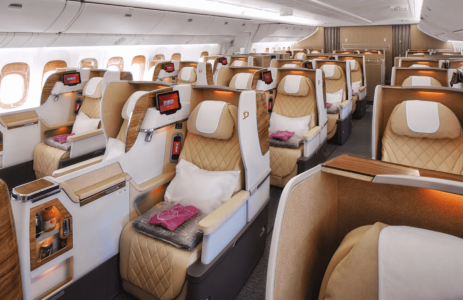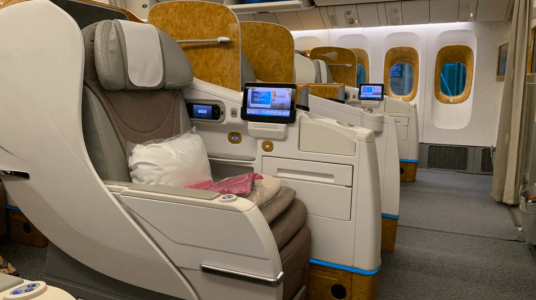A popular airline faces the consequences for misleading advertising, pays the price in court
- Replies 1
Travelling in style and comfort can be a dream come true, especially when flying in business class. But for one traveller from New Zealand, his Emirates business class experience turned out to be a nightmare.
Despite paying top dollar for his tickets and expecting to enjoy seats that could recline to a comfortable lie-flat position, access to a modern entertainment system, a minibar, and Wi-Fi, the reality was far from his expectations.
Instead, he and his wife were met with an older aircraft that lacked the advertised features.
Disappointed and feeling like he had been taken for a ride, the man decided to take legal action against the airline. After a long and arduous process, he emerged victorious, winning more than $12,579 ($13,555 NZD) in compensation.

It was discovered that Emirates had been running an older aircraft on flights from New Zealand, which was vastly different from the newer model showcased in their advertisements targeting New Zealand travellers.
Emirates attempted to defend itself by arguing that its terms and conditions allowed for variations in the advertised services. The company also claimed that their seats could recline to a maximum of 166.1 degrees, which they believed the average air traveller would consider equivalent to a lie-flat seat.
Despite these arguments, the New Zealand Disputes Tribunal ruled in favour of the customer. The tribunal found that Emirates had misrepresented the business class service available to New Zealand customers and that the airline was in breach of the Fair Trading Act.
According to Disputes Tribunal referee Laura Mueller, Emirates advertised a business-class service that was highly unlikely for consumers to receive.
Mueller's ruling was based on the fact that Emirates' promotional materials were based on an updated/new business class seat and service that was not available on the older aircraft the airline used to fly to New Zealand.
Mueller also noted that Emirates' failure to provide the promised business class experience was not due to an occasional or one-off change of aircraft due to operational requirements. Instead, the airline had repeatedly advertised a service that it was 'rarely delivering'.
This ruling reinforces the importance of truth in advertising and the need for businesses to deliver on their promises. Customers have the right to expect the services and amenities advertised and should be able to trust that they will receive what they paid for.

Following the ruling against Emirates for misrepresenting its business class service, the airline was ordered to pay more than $12,500 ($13,555 NZD). The plaintiff had sought a partial refund of the ticket price and the amount paid to upgrade to first class for a leg of the journey so that they could have lie-flat seats.
The ruling has been well received on social media, with many expressing support for the precedent it sets. Commenters on a discussion thread on Executive Traveller expressed admiration for the New Zealand man's actions and the outcome of the case.
One commentator went as far as to say that the Emirates 777 business class product is 'appalling', particularly for passengers in the middle seat.
Others believe that this ruling sends a message to companies to be more transparent in their advertising and that there should be more legal consequences for intentionally misleading advertising. A third commenter echoed the sentiment, calling for laws to be tightened to prevent companies from making false promises to their customers.

The case of the New Zealand man against Emirates for misleading advertising of its business-class services has sparked a conversation on the importance of truthful advertising. It serves as a reminder that customers have the right to expect the services and amenities advertised, and businesses must deliver on their promises.
While the ruling in favour of the customer may be seen as a victory for consumers, it also highlights the need for companies to ensure that their advertising accurately reflects the services they offer. Misleading advertising can result in legal and financial consequences, as well as damage to a company's reputation.
What do you think about the ruling against Emirates? Do you believe that companies should be held accountable for misleading advertising? Have you ever experienced a situation where a company did not deliver on the promises it made in its advertising? Share your thoughts in the comments below.
Despite paying top dollar for his tickets and expecting to enjoy seats that could recline to a comfortable lie-flat position, access to a modern entertainment system, a minibar, and Wi-Fi, the reality was far from his expectations.
Instead, he and his wife were met with an older aircraft that lacked the advertised features.
Disappointed and feeling like he had been taken for a ride, the man decided to take legal action against the airline. After a long and arduous process, he emerged victorious, winning more than $12,579 ($13,555 NZD) in compensation.

The traveller claims to have seen advertising for flatbed seats featuring minibars and updated entertainment systems. Credit: Facebook/Emirates.
It was discovered that Emirates had been running an older aircraft on flights from New Zealand, which was vastly different from the newer model showcased in their advertisements targeting New Zealand travellers.
Emirates attempted to defend itself by arguing that its terms and conditions allowed for variations in the advertised services. The company also claimed that their seats could recline to a maximum of 166.1 degrees, which they believed the average air traveller would consider equivalent to a lie-flat seat.
Despite these arguments, the New Zealand Disputes Tribunal ruled in favour of the customer. The tribunal found that Emirates had misrepresented the business class service available to New Zealand customers and that the airline was in breach of the Fair Trading Act.
According to Disputes Tribunal referee Laura Mueller, Emirates advertised a business-class service that was highly unlikely for consumers to receive.
Mueller's ruling was based on the fact that Emirates' promotional materials were based on an updated/new business class seat and service that was not available on the older aircraft the airline used to fly to New Zealand.
Mueller also noted that Emirates' failure to provide the promised business class experience was not due to an occasional or one-off change of aircraft due to operational requirements. Instead, the airline had repeatedly advertised a service that it was 'rarely delivering'.
This ruling reinforces the importance of truth in advertising and the need for businesses to deliver on their promises. Customers have the right to expect the services and amenities advertised and should be able to trust that they will receive what they paid for.

The man's flight was operated by an Emirates 777-300ER, featuring the carrier's most outdated business-class product. Credit: The Points Engineer.
Following the ruling against Emirates for misrepresenting its business class service, the airline was ordered to pay more than $12,500 ($13,555 NZD). The plaintiff had sought a partial refund of the ticket price and the amount paid to upgrade to first class for a leg of the journey so that they could have lie-flat seats.
The ruling has been well received on social media, with many expressing support for the precedent it sets. Commenters on a discussion thread on Executive Traveller expressed admiration for the New Zealand man's actions and the outcome of the case.
One commentator went as far as to say that the Emirates 777 business class product is 'appalling', particularly for passengers in the middle seat.
Others believe that this ruling sends a message to companies to be more transparent in their advertising and that there should be more legal consequences for intentionally misleading advertising. A third commenter echoed the sentiment, calling for laws to be tightened to prevent companies from making false promises to their customers.
Key Takeaways
- Emirates has been ordered to pay a New Zealand man over $12,500 (NZD$13,555) in compensation for false advertising of its business class services.
- The man purchased business class tickets for himself and his wife, expecting seats that would recline to a lie-flat position, a modern entertainment system, a minibar, and an internet connection.
- However, they were met with an older aircraft that did not have the advertised features, leading to legal action and a ruling in favour of the customer by the New Zealand Disputes Tribunal.
The case of the New Zealand man against Emirates for misleading advertising of its business-class services has sparked a conversation on the importance of truthful advertising. It serves as a reminder that customers have the right to expect the services and amenities advertised, and businesses must deliver on their promises.
While the ruling in favour of the customer may be seen as a victory for consumers, it also highlights the need for companies to ensure that their advertising accurately reflects the services they offer. Misleading advertising can result in legal and financial consequences, as well as damage to a company's reputation.
What do you think about the ruling against Emirates? Do you believe that companies should be held accountable for misleading advertising? Have you ever experienced a situation where a company did not deliver on the promises it made in its advertising? Share your thoughts in the comments below.







